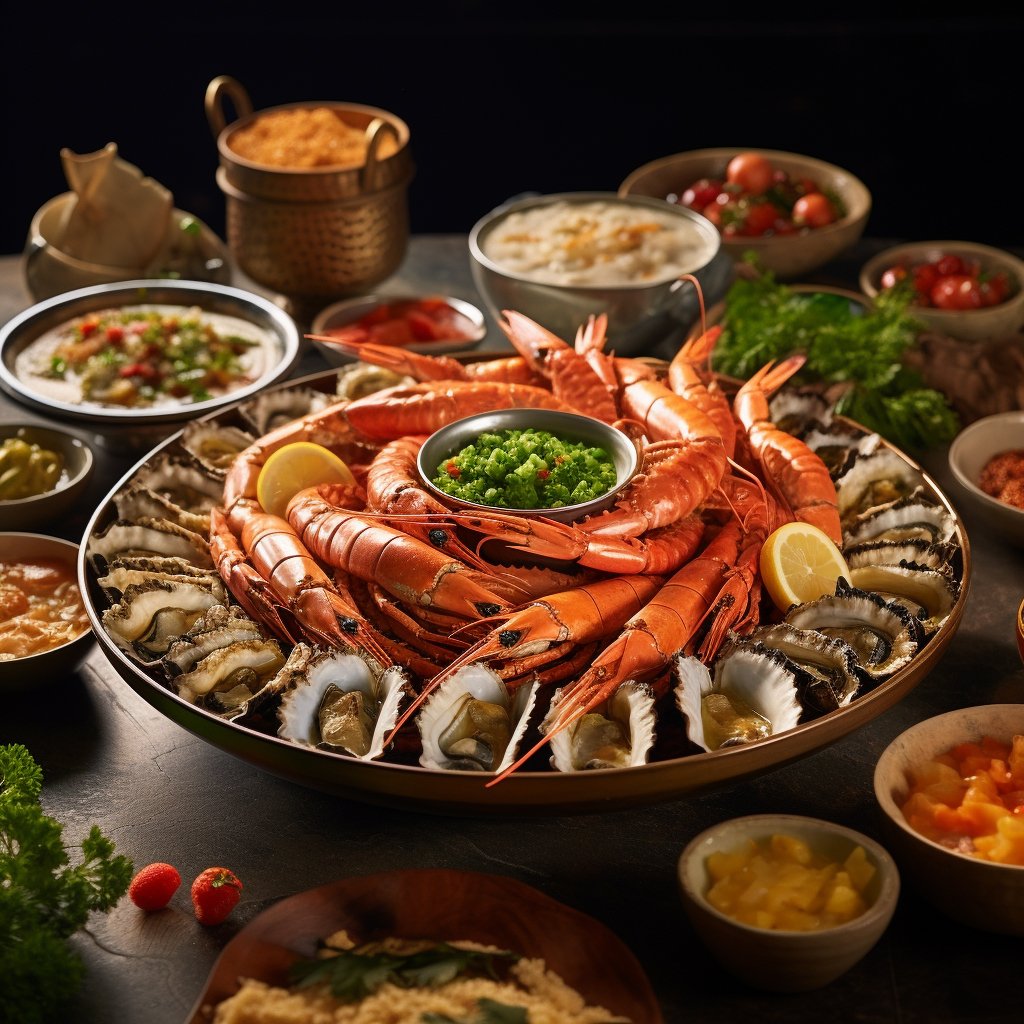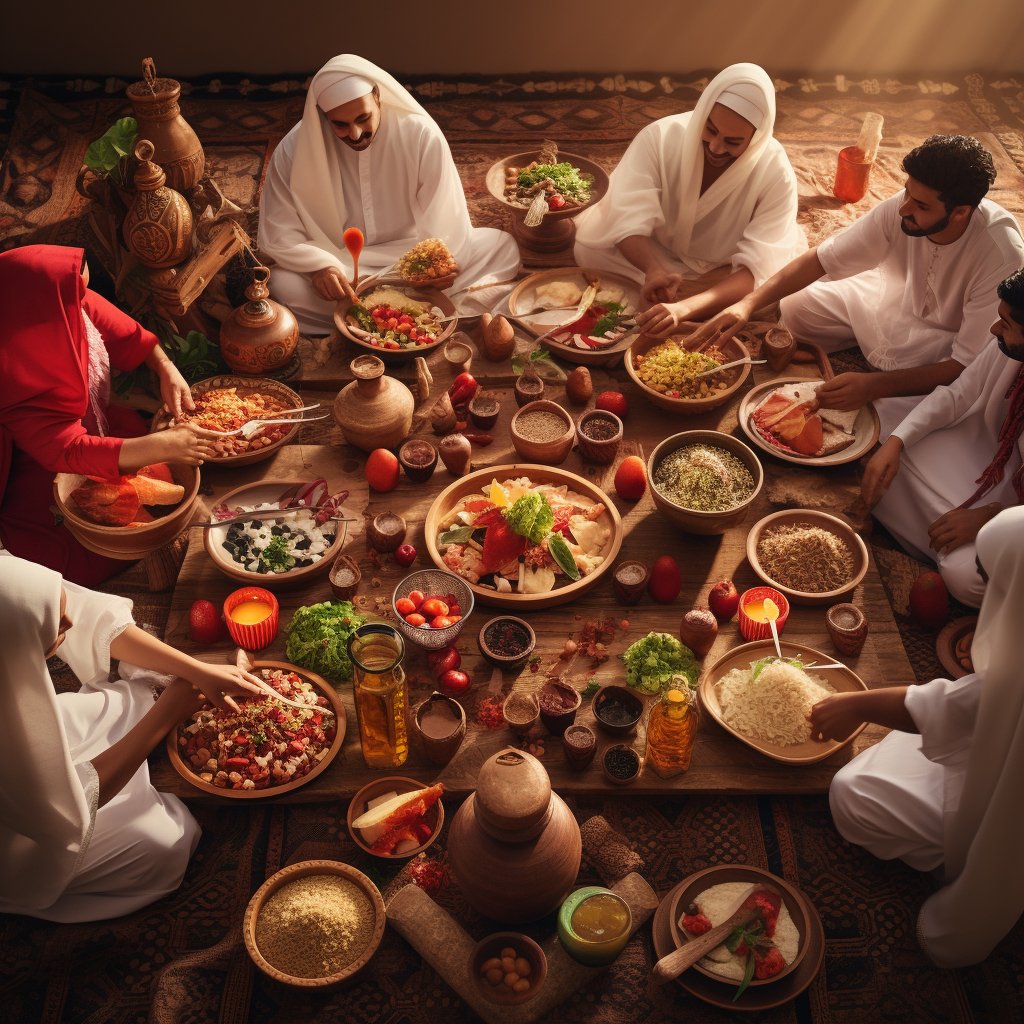
Bahraini Cuisine: A Melting Pot of Flavors
Nestled in the heart of the Persian Gulf, Bahrain’s culinary landscape is as diverse and vibrant as its rich cultural tapestry. Influenced by the spices of India, the flavors of Persia, and the culinary traditions of the Arab world, Bahraini cuisine offers a tantalizing array of tastes that reflect the nation’s historical role as a trade hub.

Bahraini cuisine is characterized by its aromatic spices, diverse seafood, and rich rice dishes. Spices like saffron, cardamom, cinnamon, and turmeric are staples in the Bahraini kitchen, lending a distinctive flavor to each dish. The liberal use of fresh herbs adds a layer of complexity and freshness that is uniquely Bahraini.
Signature Dishes
Machboos, arguably Bahrain’s most beloved dish, is a fragrant rice dish seasoned with a blend of regional spices. It’s typically prepared with chicken, lamb, or fish and often garnished with raisins and nuts. The key to its unique flavor lies in the dried lime, or loomi, which imparts a tangy, earthy taste.

Muhammar is a sweet yet savory rice dish, often served alongside spicy fish. Richly flavored with dates or sugar and a hint of rose water, it provides a perfect balance to the more intensely spiced main courses.
Seafood: A Cornerstone of Bahraini Cuisine
Given its location as an island nation, seafood is a cornerstone of Bahraini cuisine. Fish like Safi (rabbitfish) and Chanad (mackerel) are local favorites.

The Hamour, a type of grouper, is particularly cherished. Often simply grilled and seasoned with traditional spices, it epitomizes the Bahraini approach to seafood – fresh, simple, and delicious.

For a unique start to the day, Balaleet, a traditional breakfast dish, offers a surprising combination of sweet and savory. It features sweetened vermicelli topped with a savory omelet, showcasing the diversity and creativity of Bahraini cuisine.
Traditional Dress and Jewelry in Bahrain: A Reflection of Culture and History
Moving from the aromatic kitchens of Bahrain, we now explore another vivid aspect of its culture – the traditional dress and jewelry. These elements are not only fashion statements but are deeply intertwined with Bahrain’s history, social customs, and identity.
Traditional Bahraini Dress
In Bahrain, traditional attire speaks volumes about elegance and cultural identity. Men typically wear the thobe – a long, white, ankle-length garment that is both comfortable for the warm climate and elegantly simple. Women often wear the abaya, a black flowing over-garment, which is a symbol of modesty and grace. The richness of these garments can be seen in special occasions where they are adorned with intricate embroideries and luxurious fabrics.

Women in Bahrain also commonly wear the hijab or ghishwa. The ghishwa is a unique, thin black veil, offering a blend of modesty and mystery. It’s an integral part of traditional Bahraini women’s attire, reflecting the cultural values and customs of the island.
Bahraini Jewelry: Craftsmanship and Symbolism
Bahrain’s history as a renowned pearling center is intricately linked to its jewelry. Traditional Bahraini jewelry often features pearls and gold, showcasing exquisite craftsmanship. The designs are not just beautiful; they are laden with symbolism and stories. For instance, the use of pearls in the jewelry symbolizes purity and is a nod to the island’s pearling past.

Jewelry designs often incorporate symbols reflecting local beliefs and traditions. Popular motifs include the Hand of Fatima for protection and the Najm (star) design. These designs are not just decorative but are imbued with cultural significance and often passed down through generations.

Festivals in Bahrain: Celebrating Islamic and National Events
In the final leg of our cultural journey through Bahrain, we immerse ourselves in the vibrant and festive spirit of the island. Bahrain’s festivals are a colorful tapestry of traditions, reflecting the nation’s Islamic faith and its rich national heritage. These events offer a window into the soul of Bahraini society, celebrating its history, beliefs, and sense of community.
Islamic Festivals: A Blend of Faith and Joy
The Islamic festivals of Eid al-Fitr and Eid al-Adha are among the most significant celebrations in Bahrain. Eid al-Fitr, marking the end of Ramadan, is a time of joyous family gatherings, feasts, and charity. Homes are decorated, new clothes are worn, and gifts are exchanged. Eid al-Adha, commemorating the willingness of Ibrahim (Abraham) to sacrifice his son in obedience to God, is similarly marked by communal prayers, feasting, and giving.

These festivals are not just religious observances; they are deeply embedded in the social fabric of Bahrain, fostering a sense of unity and generosity.
National Day: A Celebration of Bahraini Identity
Bahrain’s National Day, celebrated on December 16th, marks the country’s independence from British rule. It’s a patriotic celebration, filled with national pride. Streets and buildings are adorned with Bahraini flags and lights, parades fill the streets, and fireworks light up the night sky. This day is a celebration of national identity, reflecting on the journey of the nation and its achievements.

The Spring of Culture Festival
The Spring of Culture Festival is another key event in the Bahraini calendar, attracting artists and performers from around the world. This festival celebrates Bahrain’s cultural diversity and its role as a cultural hub in the Gulf region. It features an array of events, including music, theater, art exhibitions, and literary readings, showcasing both local and international talent.

Conclusion
As we conclude our journey through the rich cultural landscape of Bahrain, we are reminded of the unique and intricate tapestry that makes up this small yet significant nation. From the flavorful depths of Bahraini cuisine, which tell a tale of trade and cultural exchange, to the elegant traditional dress and intricate jewelry that carry the whispers of history and tradition, and finally to the vibrant festivals that showcase the nation’s faith, pride, and artistic heritage, Bahrain stands as a beacon of cultural richness in the Gulf region.

This exploration of Bahrain’s culture reveals a country that cherishes its past while embracing the present. It’s a land where history is not just remembered but is vibrantly alive in everyday life. Whether through food, fashion, or festive celebrations, Bahrain offers a unique glimpse into a world where tradition and modernity blend seamlessly, creating a cultural experience that is both diverse and enriching.
In essence, Bahrain’s cultural heritage is a vibrant dialogue between the past and present, an enduring narrative that continues to shape its national identity and offers a warm, welcoming embrace to all who wish to explore its many wonders.

Pingback: Culinary Journeys Around the World: Discovering the Diverse Dishes and Rich Cuisine of Bahrain